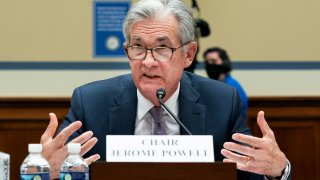
- Federal Reserve Chairman Jerome Powell and Treasury Secretary Steven Mnuchin are speaking before Congress this week as part of mandated updates on CARES Act funding.
- The act provided trillions of dollars in funding to help the economy through the coronavirus pandemic.
- In prepared remarks, Powell stressed the importance of the Fed’s lending programs through the act. Several of those programs will end Dec. 31. Mnuchin said the funds would be better spent elsewhere.
- The central bank chair offered a lukewarm view of the economy, saying the outlook has become “extraordinarily uncertain.”
Federal Reserve Chairman Jerome Powell emphasized the importance of the lending programs it has deployed during the coronavirus pandemic, telling senators in testimony to be delivered Tuesday that they've been integral in keeping the economic fallout from being worse.
Treasury Secretary Steven Mnuchin, who will appear twice on Capitol Hill with Powell this week, has said that the legislation that enabled the programs does not permit them to run past Dec. 31. The two officials are speaking as part of required updates on the CARES Act funding initiatives Congress passed to aid the economy through the pandemic.
Many of the key programs that the central bank has used since March are expiring at the end of the year, and the Fed will be forced to return the funding that supports them.
"These programs serve as a backstop to key credit markets and have helped restore the flow of credit from private lenders through normal channels," Powell said in prepared remarks for the Senate Finance Committee. "We have deployed these lending powers to an unprecedented extent."
In separate remarks, Mnuchin said the $455 billion in funding directed to the Fed would be better used for other purposes. The Fed has said it would have preferred to continue the programs into next year.
Money Report
"Based on recent economic data, I continue to believe that a targeted fiscal package is the most appropriate federal response. I strongly encourage Congress to use the $455 billion in unused funds from the CARES Act to pass an additional bill with bipartisan support," Mnuchin said. "The Administration is standing ready to support Congress in this effort to help American workers and small businesses that continue to struggle with the impact of COVID-19."
The Fed programs in question helped it buy corporate bonds, provided financing to small- and medium-sized businesses through the Main Street lending facility, and channeled money to state and local governments.
While Powell said the programs "helped unlock almost $2 trillion of funding," the actual use of them was much smaller than that – a little over $100 billion in all, though the Fed has stressed that their mere presence provided important confidence to markets.
Addressing the economy, Powell provided a lukewarm outlook that he again said will be dependent on the progress of the virus, which has been spreading rapidly lately.
"As we have emphasized throughout the pandemic, the outlook for the economy is extraordinarily uncertain and will depend, in large part, on the success of efforts to keep the virus in check," he said. "The rise in new COVID-19 cases, both here and abroad, is concerning and could prove challenging for the next few months. A full economic recovery is unlikely until people are confident that it is safe to reengage in a broad range of activities."
Powell called the recent news on vaccines "very positive" for the medium term, but said "significant challenges and uncertainties remain, "including timing, production and distribution, and efficacy across different groups."
"It remains difficult to assess the timing and scope of the economic implications of these developments with any degree of confidence," he added.
Powell repeated that the Fed stands at the ready to use its policy tools. In addition to the lending and liquidity programs, the Fed has cut its benchmark borrowing rate to near zero and is buying at least $120 billion of bonds a month.
The Fed chair will be able to continue using a handful of other programs aimed mainly at keeping markets functioning with money not tied to the CARES Act.






